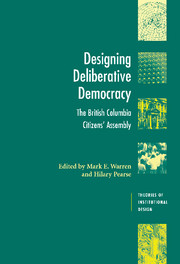Book contents
- Frontmatter
- Contents
- List of Tables
- List of Figures
- Contributors
- Preface
- Introduction: democratic renewal and deliberative democracy
- 1 Who should govern who governs? The role of citizens in reforming the electoral system
- 2 Citizen representatives
- 3 Institutional design and citizen deliberation
- 4 Agenda-setting in deliberative forums: expert influence and citizen autonomy in the British Columbia Citizens' Assembly
- 5 Descriptive representation in the British Columbia Citizens' Assembly
- 6 Do citizens' assemblies make reasoned choices?
- 7 Communicative rationality in the Citizens' Assembly and referendum processes
- 8 Deliberation, information, and trust: the British Columbia Citizens' Assembly as agenda setter
- Conclusion: the Citizens' Assembly model
- References
- Index
Conclusion: the Citizens' Assembly model
Published online by Cambridge University Press: 22 September 2009
- Frontmatter
- Contents
- List of Tables
- List of Figures
- Contributors
- Preface
- Introduction: democratic renewal and deliberative democracy
- 1 Who should govern who governs? The role of citizens in reforming the electoral system
- 2 Citizen representatives
- 3 Institutional design and citizen deliberation
- 4 Agenda-setting in deliberative forums: expert influence and citizen autonomy in the British Columbia Citizens' Assembly
- 5 Descriptive representation in the British Columbia Citizens' Assembly
- 6 Do citizens' assemblies make reasoned choices?
- 7 Communicative rationality in the Citizens' Assembly and referendum processes
- 8 Deliberation, information, and trust: the British Columbia Citizens' Assembly as agenda setter
- Conclusion: the Citizens' Assembly model
- References
- Index
Summary
Since the time of Ancient Athens, students of democracy have been skeptical that elections are a way of implementing democracy, at least if democracy requires something like government “by” the people rather than “of ” or “for” them. There are several grounds for this skepticism: first, elections may select unusual people – better, more able, or merely more ambitious leaders – and thereby exclude ordinary people from a regular role in government. Second, whether or not elected leaders are especially skillful, those elected to office tend to become a professional class with knowledge and interests separate from those of ordinary people. The Athenians themselves thought that lottery was the more democratic way to fill office, as it ensures that anyone who wanted to serve would be able to do so. Indeed, Aristotle defined democracy as a system in which people take turns ruling: where each rules and is ruled in turn (Aristotle 350 bc [1963]: 1317b).
Nowadays of course, every state is supposed to be a democracy – in the sense of drawing its authority to rule from the people – and modern reaction to this expectation has generally been to tone down expectations for democracy: to settle for electoral or representative democracy as the only feasible kind of democracy in modern circumstances. So, rather than the people ruling directly, elected elites rule on their behalf.
- Type
- Chapter
- Information
- Designing Deliberative DemocracyThe British Columbia Citizens' Assembly, pp. 192 - 213Publisher: Cambridge University PressPrint publication year: 2008
- 17
- Cited by



